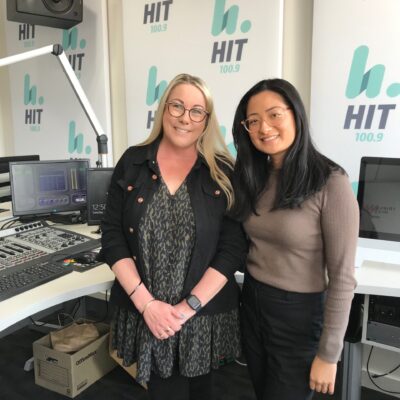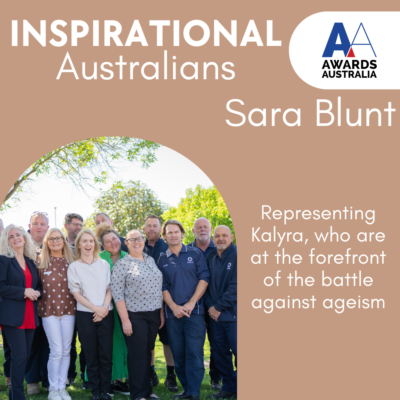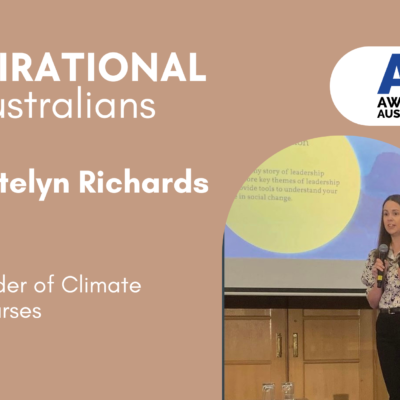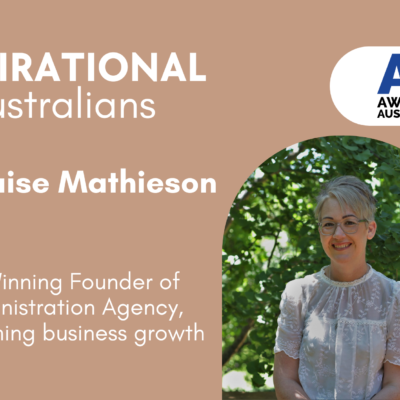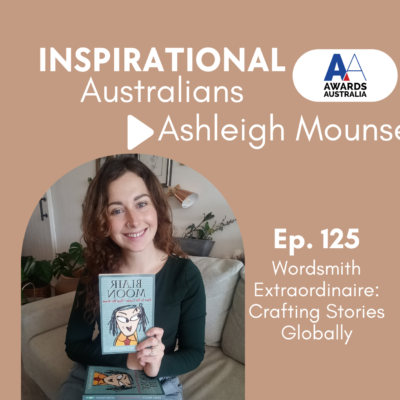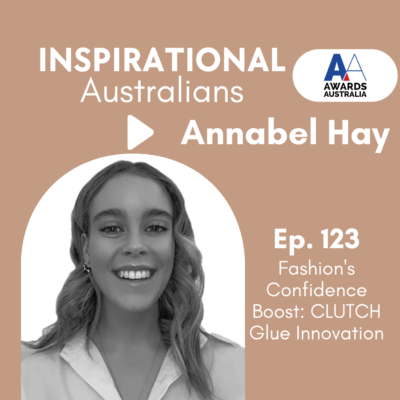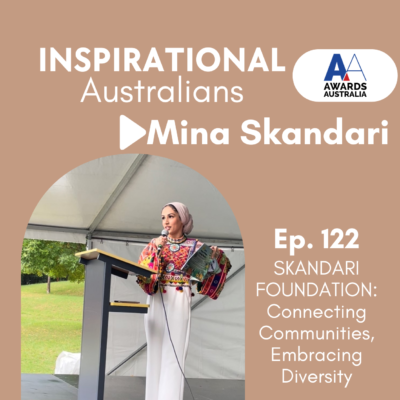In this week’s episode, Geoff is talking to Lila who was the overall Premiers Young Achiever of the Year Winner in the 2015 Tasmanian Young Achiever of the Year Awards.
Dr Lila Landowski is a neuroscientist with the UTAS School of Medicine, as well as a science communicator and science advocate. Her current field of research is stroke and fatigue.
Lila is the 2015 Premier’s Young Achiever of the Year, a Tasmanian finalist for Young Australian of the Year in 2016, and a winner of the Australian Institute of Policy and Science Young Tall Poppy award in 2018.
In this episode:
- Hear how passionate Lila is about her research and the encouraging results she is seeing
- A bit of fun as Geoff and Lila set about solving the problems of the world!
- A really interesting listen from a very accomplished scientist
Links
Connect with Lila on Instagram
Connect with Lila on Twitter – @rockatscientist
Follow us on our Inspirational.Australians Instagram Page
Want to nominate someone? (It can take as little as 2 minutes to recognise someone making a difference)
Like some more information on Corporate Partnership?
Transcript
Annette:
Welcome to the inspirational Australians podcast, where we chat to people, making a difference in their communities and in the lives of others. And here is your host for today, Geoff Griffin
Geoff:
Our inspirational Australian podcast guest today, epitomizes the word inspiration. She’s a neuroscientist with the UTAS School of Medicine and director of the Australian Society for Medical Research and also with epilepsy Tasmania as well as a science communicator and advocate. Her current field of research is stroke and fatigue. She was the 2015 Premiers Young Achiever of the Year, the Tasmanian finalist of the Young Australian of the year, and a winner of the Australian Institute of Policy and Science. And also just to add a little more Young Tall Poppy Award winner in 2018, she was an ABC top 5 Science Scholar in 2019 and has also been an ambassador to public school education and his patron of the National Science week in 2019. She used in fact, the very amazing Dr. Lila Landowski! Welcome to the podcast, Lila.
Lila:
Thank you so much. Absolute pleasure to be here today.
Geoff:
Well, I think I should be asking for your autograph. That’s a super impressive,
Lila:
Thank you for that super generous introduction.
Geoff:
My pleasure, and I’m really excited to talk with you today because you really have pushed the limits of what I believe one human can achieve in such a short lifetime. And in addition to winning the Premiers Young Achiever of the Year, you won the St. Luke’s Healthier Community Award in 2015, and also the Career Kickstart Award in 2014, looking back, Layla, what do you think the judges saw in you going back to those times?
Lila:
Well, Geoff, I think, you know, they probably saw that I was doing some really exciting research at the time. Um, I was working in the lab, trying to understand how to regenerate nerves in the skin. And certainly my early research suggested that when we could actually do that. I was also working really hard to try and communicate science, particularly to school students. And I guess try and engender a passion for science in the same way that had happened for me when I was younger. Um, and I suppose they might’ve also picked up on the fact that, um, you know, I was a care for my parents who had chronic illness at the time. So trying to juggle these different hats and just doing the best I could in contexts.
Geoff:
Clearly the judges thought that as well, they’re there. And I do remember quite clearly sitting there on that final day of judging when we did come all, come together, the word “wo” did get echoed a number of times. Then you certainly are extraordinary doing so much in so litte time. How did being nominated and becoming an award recipient help you personally, and also through your career?
Lila:
Just the entire awards process was just incredible. And I think for me the biggest thing was it really gave me a sense of self worth. You know, like I think honestly, you know, if, I suppose if I’m honest with myself, there was a lot of pain and sacrifice and, you know, suffering to get to that point in my life. And I don’t think you can ever really justify suffering, but, you know, having an award, which says, Hey, other people think that you’re doing a good thing. That just meant so much to me. And I guess in another sense, so I had always been so private, like painfully private about my struggles I’m even struggling now. Like it’s something that I don’t think even the people around me really knew about, you know, for example, that I was caring for my parents and having those sorts of challenges. So I think it just gave me an immense sense of, um, validation that, you know, Hey Lila you’re on the right track and what you’re doing is important and it is helping the people that, you know, whose lives you’ve touched in that way.
Geoff:
Yeah, absolutely. And comes to mind, you should never judge someone by what they are saying, how they’re looking, because you don’t know what they’ve just been through or what they’re going through. So never presume anything. And I think what you’re saying, it’s really important in that regard.
Lila:
Yeah. I, you know, we’re all kind of like an onion, we’ve all got our layers and, and some people are happy to, to, to show and bare all and others, you know, they’ve got a lot of challenges that they’re facing. And if, if you, if you make assumptions about people, you’re almost instantly going to be incorrect about someone. And I think just opening, uh, approaching the world with a sense of, um, openness and not making assumptions about people is a really great way to kind of navigate these situations.
Geoff:
Yeah, absolutely. Well nominations for the 2021 awards open soon, would you encourage our listeners to nominate someone they know and why.
Lila:
Absolutely. You know, it changed my life. It changed my life. You know, it’s not just that it helped me, um, I guess have a bit of sense of self worth, but it gave me exposure. It gave a platform to really talk about things that I’m passionate about. And you know, all of these things, whether you win an award or not, it’s just the act of being nominated and knowing that someone thinks that you are doing a good thing, but they believe in you, that is so powerful. You will actually change someone’s life by nominating them.
Geoff:
Yeah, absolutely. It’s that validation too, that you mentioned is so important. People like yourself, don’t go looking for accolades. And as you said, actually, quite a drawn and maybe shy person in terms of sharing your story, but to receive that acknowledgement from someone to say, Hey, Lila, you are amazing, we think you’re doing a great job is so important. So thank you so much for that. Anybody who would like to nominate of course, can go to our website at our awardsaustralia.com, check out the categories there. What have your priorities been since winning the awards in 2015?
Lila:
Well, a big thing for me is my research. I am so passionate about working in medical research. I really feel like I’m living the dream. I get to spend time thinking up questions and trying to figure out how to answer them. So I guess that is my focus at the moment. So I’m technically a postdoctoral research fellow, which is basically a fancy way of saying that I’m a full time Neuroscientist. Um, and yeah, that’s what, that’s my focus, but also what’s really important to me is, is trying to communicate science in a way that people can understand, that is approachable. So those are my, my big things in my life at the moment.
Geoff:
What have you identified today? And what more are you hoping to achieve with your straight research?
Lila:
Uh, so I have worked across quite a few different areas. Now I’ve worked in dementia, I’ve worked on nerve regeneration. And if I just take a moment to talk about the work that I did in my PhD, which was involved in my, one of the reasons why I have won this award. So I identified this particular natural protein, which exists in nature, which can actually regenerate nerves in the skin and the thing is we actually tested these. So I actually tested this in friendly lab rats and we never actually got to the, or that it would actually work in humans. And it’s really frustrating that you might have these really exciting potential treatments that could actually have implications for human health. You know, this might actually stop people from suffering from pain, for example, it’s a big deal, but if you don’t have funding, you can’t continue, you know, following that line of interrogation and figuring out whether it’s going to help. So I found it quite challenging having to give up this really exciting area of research simply because there was no funding to continue with that. Since then, I’ve also been always recruited to work in treating dementia. And then I was also recruited to work in stroke research, which is what I’m doing at the moment. So what I’m trying to do in the context of stroke research is really find a better way to test stroke drugs. And the reason for that is, a stroke happens when a blood vessel in the brain either becomes blocked or it ruptures. And really what happens is it’s starving that part of the brain of oxygen and nutrients, and it dies. So having a stroke is a big thing and it’s one of the leading causes of death in the world. And we’ve only got this one particular drug, which can potentially help people, but really it only actually helps a very small proportion of people who have these strokes. And the thing is we’ve been trying to find stroke treatments for over 60 years. And in fact, there’s over a thousand drugs, which work to treat strokes in like a Petri dish or in like an animal model of disease. And when I say that, I mean like, um, if a dog or a cat or a rep has a stroke, so we’ve figured out how to do that, but it’s not working in humans and you might wonder, okay, well, why is it working in this context, but it’s not working in humans. And it’s because of the way we’re actually testing these drugs. So the way we’re testing these stroke drugs is a bit flawed. It’s not exactly what happens in a human. So what I’m trying to do is to develop a new way of testing these drugs, to see whether we can actually have a better chance of finding a treatment that works in humans.
So it’s, it has huge implications for stroke research, but it’s also incredibly difficult. I’ve been working on this problem for a few years now. And, um, it’s really taught me that you need resilience in science. You have an idea of how this experiment is going to go and if it actually works well you’re lucky, actually I’ve found that, um, yeah, you know, I, we, we science is unpredictable and it is, and it is difficult, but I think that’s, what’s one of the great joys of research is that you are on the leading edge all the time. You know, you’re the first person to see the result under the microscope. And sometimes it works and sometimes it doesn’t. So that’s what I’m working on at the moment. And yeah, I’m really excited about where this is going in the next couple of years.
Geoff:
So do you feel that there’s a light at the end of the tunnel in terms of being able to turn the testing successfully from rats and so on to humans?
Lila:
I certainly hope so. Yeah.
Geoff:
Yeah, that would be exciting! I have to say it’s a major cause of disablement and death for people. So fingers crossed. Is there any chance that we’ll have regenerative capacity? If it really is preventative or excuse my ignorance.
Lila:
So it’s really going to help people develop all the different types of drugs. So whether it’s one that helps you regenerate brain cells, for example, or stops brain cells from dying, it’s really kind of like a, a way of testing those drugs properly. So it’s not that I’m trying to find something that regenerates the brain in this context in stroke. I’m actually trying to find, develop a tool that lets other people test their drugs. So we know actually unequivocally, whether they’re more likely to work in a human,
Geoff:
Well, I guess that’s a really critical first step, isn’t it?
Lila:
Absolutely. Absolutely. And it’s kind of frustrating that, you know, we, you know, we are still working on that.
Geoff:
Well, other people have been doing it for 60 years. So let’s hope for all of our sakes that there is a breakthrough and I know you’ve had many, but it’s that final step that we’re all searching for. Now, your research has been, as we’ve just discussed based around stroke and fatigue, that’s related, I guess, how do you stop your own burnout and fatigue because you work so hard. How do you personally cope when you’re feeling flat or low or you’re feeling the burn out?
Lila:
Oh, you know, I love that question, because as a neuroscientist, I’ve learnt about all the things that are happening in your brain when you’re tired and all these things. So I’ve learned a lot of these tools that can actually help our brain work better and overcome these feelings. And I know that a lot of the people listening right now, this is recorded during the pandemic. So there’s a lot of people out there who are feeling really tired, really exhausted, and that’s actually normal. Um, you know, we are in a time of our lives where we’re experiencing this chronic stress. People have lost their jobs, people are schooling the children at home, and this is a situation that we’ve never encountered before. And what that’s doing is it’s causing us to be constantly stressed. And we know that if you’re constantly stressed, it changes the brain. It’s changing our brain right down to the level of our DNA. And that’s why we noticed that we might be more, um, you know, having, having trouble concentrating or having trouble focusing or not sleeping properly, or even being angry, irrationally angry. All of that is actually part of our body’s stress response. Part of us trying to cope. And I guess in the recent, in recent decades, we’ve come to realize that the brain is really adaptable and we can do certain things to help us overcome those changes. One of them is actually exercise. So here’s the thing we have thought for a very long time that you have a set number of brain cells. And, you know, as you get older, or if you drank a bit too much, we kill them. Well, it turns out that’s not exactly true. So we actually have STEM cells in our brain and STEM cells have the ability to make new brain cells. So our brain is actually constantly making these new neurons and exercise is actually one of the most potent stimulators of these new brain cells. And so if you’re not, if your brain is not functioning properly and you are experiencing burnout and fatigue, and a lot of these things, a great thing that you can actually do is actually to exercise because it’s helping make new brain cells. It’s also increasing blood flow to the brain. It’s helping your brain make these growth factors that make your brain cells work better. And it also makes you more attentive. So it makes you focus. We know that if you exercise for 10 minutes, you can actually have more focus and attention for the following for like two hours afterwards. So if you’re trying to, if you’re tired and you can’t focus on a task just quickly run on the spot for like 10 minutes and you will be so much more productive in the following, like two to four hours after that. That’s just one example, but we also know that socializing, socializing and actually sex as well. These two things are connection with people like talking to people is actually changing our brains as well. You know, we know that when you talk to someone, you are actually releasing these hormones or called, one of them is called oxytocin, and it helps us form a connection with someone. It helps us have that feeling of bonding. You know, when you’ve got a problem and you talk to someone about it and you end up feeling good, the reason to it is because you are releasing these hormones and it’s also helping reduce those stress hormones as well. So it has two different ways of making you feel better. And, you know, we’ve also got the way we eat. The way we eat can also affect how, how fatigued we are. We know that people who are eating a high fat or high sugary diet, which I think a lot of us are right now in, in, in this pandemic time. It actually makes us, it stops the brain from making these new brain cells. So it’s actually bad for our brains. I mean, we’ve always known that sugar is not really very good for you, but it actually does change our ability for our brain to adapt. So instead of having a high sugar or high fat diets, like try and put the chips away and try and have something healthy instead, we know that actually, if you, um, try intermittent fasting, or if you, um, use calorie reduction for like, if you reduce your dietary intake by 20 to 30%, we know that that also helps you make new brain cells. So there are all these different things that can actually make you feel better. And it’s not just like feeling less tired, but they’ll actually make you feel, make you feel happier.
Geoff:
So it’s clear that exercise is really important and talking to people as well. Lila, I think that is really important. And for some, it may be really tough at the moment, particularly if you live in Victoria where we’re total and that talking to people is really critical. And if you have nobody that you’re able to talk to or feel comfortable, maybe Lifeline is there for you, One, three double one, one four. And you know, it’s not an embarrassing thing to talk to someone they’re there not to judge, but just to chat. And I think, as you’re saying, just to get things off your chest, just to talk to someone is so vital.
Lila:
Absolutely. And, and we know that physically talking to someone is better than texting. So if you can choose between calling someone and texting, try and call them instead, you don’t have to FaceTime, but just call them because we know that if you’re texting, your brain releases this toxic, this anything have a choice, try and actually call someone rather than text. And the reason why I say that is because we actually know that calling someone and actually hearing their voice and hearing their responses actually has more potent effects on your brain than texting alone does. So we have a part of the brain, which is activated when you text it’s the reward pathway. It’s what you kind of feel nice after someone sends you a text. But when you’re talking to someone you’re getting that reward pathway activated, but you’re also getting that oxytocin, that thing that makes you feel good, and it makes you feel connected with someone it’s that stress relieving hormone. So in that context, you can try and call someone rather than texting them and it’ll make a difference, you’ll feel it.
Geoff:
Sounds very sciency, Lila, but in all seriousness, such good advice, because it is really, really critical. You may not know there’s, since I was 20 year old, which was a while ago, of course, I made a promise and a pact to myself that I would pay five compliments every day, every day of my life, which I have done. And at the moment, my wife’s getting a lot because, um, but yeah, five compliments a day and there are people in our team who said, what if people think you’re a weirdo. And I would say, what does it matter? You know, if one person a week thinks I’m a weirdo and the others have all benefited, then all power for that. So I’ve had people stop, turn around and say, Hey, thank you so much that I really needed it. That just made my day. And that makes my day! So really important to exercise, to talk and to be thankful and thank them for what they’re doing for you. And of course that is what the awards are all about. This is thanking and acknowledging people who make a difference.
Lila:
Yeah. We need you to have an award, that would feel so great.
Geoff:
Well, my award is being able to give others an award for what they do that keeps up, keeps me going day by day. And I enjoy getting out of bed so much. Cause if we have the chance to nominate one more person, you know what that’s, that’s absolutely brilliant for that validation and the thrill that they will get. And of course not forgetting the person who makes the nominations. That’s really exciting for someone to be able to acknowledge someone else’s well thru for them too. Just changing pace for a moment, what’s something that we might not know about you?
Lila:
Ooh. Um, I love music. Music is life to me and I used to be in a band, which is exciting.
Geoff:
Wow. What did you, what were you doing in the band? What is your role?
Lila:
I was the passion. I was the shy girl. I was the tambourine. I was the triangle. It’s just, yeah,
Geoff:
Well they’re a bit of a mover and shaker. So that word.
Lila:
Yeah. All of that. Yeah. I love it. I love it. Another thing that I really love is fishing. There’s something really, um, I don’t know, organic about knowing that you can go out and catch your own meal and, um, provide for yourself. And particularly as a kid were in, obviously I didn’t have money. I’m like, well, I can still provide. It was, it was a good feeling.
Geoff:
Beautiful. I think it’s really important to have something. And speaking of that, what should passion and what compels and drives you to keep achieving when achieved so much already?
Lila:
You know what I think, um, I think suffering teaches something that no book could ever really teach us about empathy. You know, you know, it’s this thing that is really troubling at the time, but it ends up being a gift that helps us break compassion. You know, I think it’s really hard to empathize with someone and be driven by that if, if you haven’t walked that path and you know, we’ve all had layers, we’re we’re, if we’re all an onion, we all have our layers. I’ve had layers that I haven’t talked about, and I’m not going to talk about that here today, but I just feel like if you have had certain life experiences, it certainly allows you to help people who have experienced similar things and have a, have a level of connection. Um, another thing that’s really important to me that really drives me, um, that I’m passionate about is just seeing the people that I love succeed. You know, I just want to put them on a pedestal. I just, I just really want the people that I love to look good. You know, I just, I feel really privileged to be surrounded by a lot of great women and men who really just, you know, they have taught me my most important life lessons. They’ve taught me about myself or about relationships or about, you know, things that I, that we don’t learn about in school. And I’m really lucky to be in an environment where I am supported. And I think I probably didn’t used to feel that way. And I think it’s only been in recent years where I’ve actually had the courage to talk about things to people. You actually start having those connections and actually having really authentic conversations with people. And as I mentioned, winning this award allowed me to be a bit more open about myself. So it’s really been a gift that it is carried through and helped me in ways that I never could have imagined.
Geoff:
Oh, that’s so good. And our listeners, I think, are just starting to get a glimpse. That Lila is a very gentle kind, caring and giving soul. And you’re always looking to make a difference for others. And I’ve always admired that about you. When we first meet someone, you can often know what type of person they are. And I sense that from the first time I met you at the awards presentations in 2014, having of course met you via a judging process, not physically, but in writing and so on. So it’s a privilege to actually put faces to the names that you read about on paper at a judging process, and then meet them personally. And you certainly didn’t disappoint in terms of all the things that the judges thought about you. So I really admire and acknowledge the work that you do, and the person that you are as well. And of course you then went on to be an executive judge member the next year. And you’ve been to a number of our award presentations as well, following your wins in the two years of 14 and 15. What’s next for Lila?
Lila:
That’s the million dollar question, isn’t it? Honestly, I’m living the dream. Now I’m doing the job that I dreamt of doing when I was seven years old, I’m a medical researcher and that’s incredibly exciting. Um, obviously I love communicating science as well. And I love having both of these two things in my life. So I can’t live without research, but you know, who knows what opportunities present themselves. And I’m certainly open to opportunities as they, as they arise. We’ll see, we’ll see Geoff.
Geoff:
Well, let’s hope the funding for your current research into stroke and fatigue remains constant so that you do find that elusive ability.
Lila:
It isPrecarious. I will say like the success rate is like 10%. So we are hoping that we’ll get funding for next year, but you know, also that might not happen. So we’ll see.
Geoff:
Well, that’s fingers crossed and if anybody’s listening out there that can have an impact on that, come on, guys, girls let’s get it together. Um, what do you think the world needs more of right now?
Lila:
Um, one thing that I, I find challenging just on social media is we have a lot of misinformation and I think we really need more critical thinking. You know, we often don’t think that individually we have an impact, but you know, if you share something on social media that is fake news, your loved ones don’t necessarily know that it’s fake news. So they’ll probably just think, okay, you know, if Lila thinks it’s true, then it’s probably true. So I’ll share it and you know, and then their friends will share it and you can quickly see how one person can actually change people’s lives by sharing a bit of bad information. And I think we really have a responsibility to our friends and to our family to kind of just take a moment to do some digging and make sure that we’re not sharing fake news. And yeah, so it really comes down to critical thinking. We need more critical thinking.
Geoff:
Yeah. I think one of the problems with social media, as well as the people that are very keen to provide destructive feedback rather than constructive, I think it’s really important to feel that you’re in the place with that person or you’re talking face to face, whether it be live one zoom or whatever, rather than as someone that has no face. And he can say whatever you like with repercussions. And I just find that to me is a sad thing with social media.
Lila:
Yeah, you’re absolutely right. Um, if I could just add one more thing actually on that, I think a lot of people are sharing things online and, and they really mean well, they really want people to have this piece of information that might help them be healthier or happier or understand something a lot better. Um, but I guess really, I just think we have a responsibility to do a little bit of digging and to make sure that we’re sharing something, that’s the truth. You know, look on Snopes for example, and see whether it’s fake news or not. Um, and that’s a great way of getting a quick understanding about whether something is true or not.
Geoff:
Yeah. That’s so that’s, so right Lila! we do have good intentions by the largest part. And conversely don’t attack someone because they might get a little bit wrong or they have good intentions that, uh, providing information. That’s not exactly right by all means, let them know, but don’t attack them, say probably doing it with every good intention. So you made a really valid point. They don’t think we’re solving problems of the world just quietly. Is there one piece of advice that you’d like to leave for our listeners?
Lila:
Yes, actually I, I just really want to instill the importance of education. You know, education is this great equalizer. It really gives us all an opportunity to level the playing field. If you have a great education, you have a chance to succeed. So if you have the knowledge, you essentially have the tools to help better your life and help create your own opportunities for yourself.
Geoff:
Yeah. You’ve done quite a bit in the media as well. You know, you’ve done a number of gigs for various media. Can you tell us a bit about that?
Lila:
I’ve been doing science communication for about 10 years and I guess at least the last six years kind of doing things through the radio and writing articles and that sort of thing. I started, uh, after the Young Achievers Awards, after I won Premier Geometry Review, I started doing a radio program called the Lila Landowski report on ABC radio Hobart in the breakfast show. And then I ended up doing a program called Science Club where we talk about exciting new science in the evenings. I’ve been doing stuff on Hit 100.9 Jimmy at night program, in a program called Dr. Lila. And I’m also doing a bit of a breakdown of exciting things. And last year I was one of the winners of the ABC’s Top 5 Science Scholars. So me along with four other really fantastic researchers from around Australia, we learnt a little bit about, um, how to communicate and how to do things more effectively, essentially through this two week internship, which we did in Sydney, which is incredibly exciting. And it’s given me connections and opportunities to keep communicating science, through ABC news articles and through that sort of thing,
Geoff:
How brilliant that is so, so amazing. And I’m feeling really privileged to be talking with such a megastar, and I’m sure our listeners would agree. You are an amazing person and I do feel very inspired to know you, but also to hear your story, Lila on the things that you’ve done since winning the Tasmanian Young Achiever Awards. Where can our listeners connect with you online, if they want more information or to follow your journey?
Lila:
You can find me on Twitter, on Instagram and on Facebook by looking up the rockatscientist. So literally just type rock, like R O C K at scientists. And the reason why it’s called the rocket scientist is because a few years ago, I had a friend called Emily Ainslie and she gave me this nickname, the rockatscientist. He was a bit of a play on words. she’s like, Oh, you rock at science? You are a rocket scientist, but that’s how it stuck. That’s where that name comes from. I don’t do geology. I don’t do things with rockets. I’m just, that’s just my nickname. So you can, you can look me up on those different forms. You can also find me on LinkedIn and I hope you can connect with me there.
Geoff:
Lila, thanks so much for spending some time with me today and of course with our listeners, you’re an inspirational Australian and it really has been great to catch up with you again, even if via zoom. And if anybody would like to get the links to today’s chat with Lila, head to awardsaustralia.com/podcast.
Lila, thank you so much. It’s been really wonderful.
Lila:
It’s been a huge pleasure. Thank you so much for the opportunity to talk to you today.
Geoff:
Thank you Lila. Now until next week, stay safe and remember you can be the difference. I hope you enjoy today’s interview as much as I have. We would love you to subscribe to our podcast so you won’t miss an episode. Join us each week as we talk with ordinary Australians achieving extraordinary things. Did you know that awards Australia is a family owned business that proudly makes a difference in the lives of those that make a difference for others. And we thank our corporate and not for profit partners for making our awards programs possible. If you know someone that’s making a difference or maybe your business might like to sponsor an award, contact us through our Instagram page, inspirational.australians or head to our website awardsaustralia.com. It would be great if you could share this episode with your network because who doesn’t like a good news story and please rate and review us. We would really love to hear your thoughts until next week, stay safe and remember together, we make a difference.
Annette:
Thanks for joining us today on the inspirational Australians podcast, we hope you enjoyed listening and have been inspired by ordinary Australians, achieving extraordinary things. So it’s goodbye for another week. Remember together, we make a difference.



